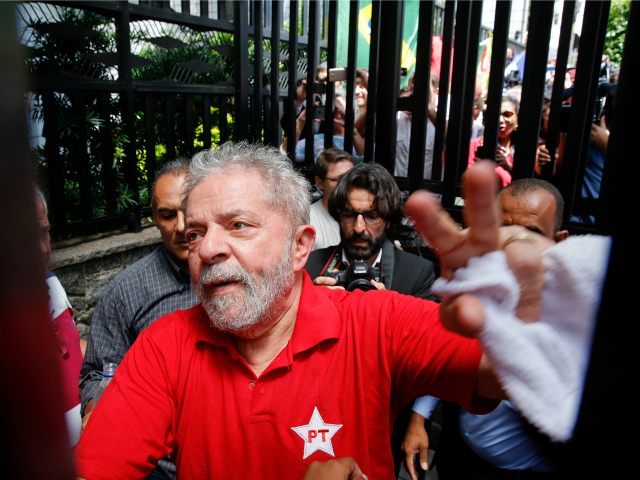Brazil’s socialist Workers’ Party (PT) is scrambling for a plan after its leader, Luiz Inácio Lula da Silva, began to serve a 12-year prison sentence on corruption charges Sunday.
Party leadership is divided between gambling on Lula’s last appeal freeing him to participate in October’s presidential election, where he is a clear frontrunner, or opting for another candidate.
In July 2017, shortly after a domestic federal court convicted Lula of taking over a million dollars in bribes and buying a luxury beachfront property, Brazilian newspapers reported that, among the PT elite, “it is forbidden to speak of a Plan B” to Lula. The former president, widely popular among the nation’s less educated and touted as “the most popular politician on earth” by former U.S. President Barack Obama, was initially sentenced to 9.5 years in prison but, on appeal, received a heavier sentence.
Last week, Supreme Federal Tribunal (STF), the nation’s highest court, denied his defense a petition for habeas corpus, urging the court to keep him out of prison until he exhausted his final appeal.
Before being transported to serve prison time in southern Curitiba, Lula reportedly left a plan of operation in place for his Party. The president of the PT, the lawmaker Gleisi Hoffmann, would take over running the party de facto, even though she had been running the party de jure with Lula at the helm for much of the time following his first presidency. Former mayor of Sao Paulo Fernando Haddad is reportedly being touted as the alternative presidential candidate if the party chooses to move on from Lula.
Meanwhile, the PT seeks a way to keep Lula actively participating in politics from behind bars. Folha de Sao Paulo reports that the party is seeking to add Hoffman to Lula’s official legal team, which would grant her the ability to visit him and discuss politics more often.
On Monday, Brazilian newspaper O Globo revealed that Lula’s imprisonment, which began Sunday, has “exposed the internal divisions in the PT over the strategies the Party should adopt now related to the judiciary and the elections in October.” The core of those divisions, the newspaper explains, is whether to try to generate mass anger at the STF for their decision and whether to recruit a new presidential candidate.
Hoffmann is reportedly leading a faction of the party “in favor of raising attacks” on the judiciary. These politicians argue that two convictions against people are not enough to force them to serve their sentence if a third, final, appeal remains available. As STF Judge Carmen Lúcia argued during her vote against the defense’s petition last week, the STF has repeatedly ruled that imprisoning someone after a conviction and failed appeal does not violate due process rights.
On the matter of the election, O Globo reports, Bahia state Gov. Rui Costa is leading the socialists who wish to appoint a new candidate to take over the PT presidential race. Hoffman has, for now, rejected their demands for a viable presidential candidate who is not a convict.
Lula’s popularity does not necessarily transfer to other leftist candidates in the race. Estadao notes that the likelier scenario is that the votes that would have gone to Lula will be distributed somewhat evenly among other non-PT leftists if Haddad or another candidate replaces him on the ballot. Environmentalist leftist candidate Marina Silva and Brazilian Social Democracy Party (PSDB) candidate Ciro Gomes reportedly stand to gain the most from a race without Lula. Leading all candidates in the absence of Lula at the ballot box, however, is the conservative lawmaker Jair Bolsonaro, who has taken the opportunity of Lula’s arrest to reintroduce himself to the public as one of the only prominent politicians in Brazil not tied to the corruption scandal that resulted in Lula’s conviction.
Lula was arrested as part of a larger investigation known as “Operation Car Wash,” which revealed a massive corruption scheme run out of the state-run oil corporation Petrobras involving dozens of politicians. Under Lula’s presidency, politicians would grant overpriced contracts to contractors like the disgraced company Odebrecht in exchange for a cut of the extra money. Odebrecht ran similar schemes globally; the Brazilian government used a variety of firms to the same ends.
According to Brazil’s federal police, Lula must serve his time in Curitiba because the city is the home city of Operation Car Wash. Curitiba’s federal crime unit “specializes in financial crimes and the laundering of assets” and discovered that much of the money involved in the Petrobras scheme was laundered through businesses in Paraná state, where Curitiba is located.
Folha reports that the PT is mulling a campaign to turn Curitiba into something of a pilgrimage point for leftists to protest police action against corruption.

COMMENTS
Please let us know if you're having issues with commenting.